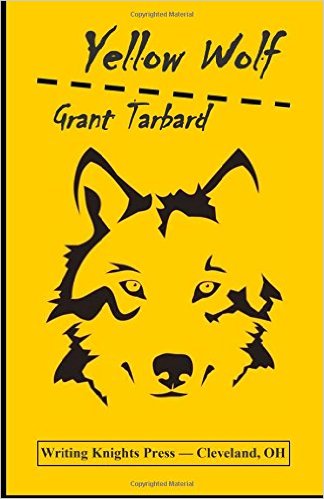Tongues of Fire by Jane Burn
– Reviewed by Grant Tarbard –
I first encountered Jane Burn as an illustrator: her wonderful artwork lit up the page and made the accompanying poems sing like a Swainson’s Thrush. Her artwork is very well known in the UK’s poetry community, for it is as beautiful as it is layered, but she is also a renowned writer who has sown her poetic oats in magazines across the land. She is the founder of the excellent poetry magazine The Fat Damsel. Her pamphlet, Tongues of Fire, is published by another exercise in magnificence, The Black Light Engine Room.
On opening the pamphlet, I am greeted by an angel looking down, hand splayed across the heart, because the poem of the same name is about a cemetery. It’s fronted by a photograph of an ornate headstone. I feel the poet walking through the graveyard, perhaps sitting under a tree like ye olde poets did, and absorbing the world of the dead around her, or rather the life that once was. The poem is broken up into twelve distinct verses: the first has a melancholy humour to it, with a South Yorkshire accent: all those words of dialect, the thin red line beneath them on the screen blinking in its ignorance.
Agnes Seth knew how many mickles
made a muckle – many a little bird
told her so.
Edith Rowell, all fur coat and
no knickers.
It reminds me of Maggie May, the traditional Liverpool folk song which The Beatles loved it for its ceremony of naughtiness. The poem continues to list the lives of the departed, lingering about us with their smiles, yawns and sighs.
Richard Candlish is always buying her flowers.
She takes them and smiles, but her eyes
rake the lawn behind his head, where
Fenwick Hunnam stands with his hand
on the shoulder of his seated wife.
Verse V is heartbreaking, its simplicity deceiving, for this is an Unchained Melody of a poem, and time can do so much.
Humphrey Hopper Green ought to have been
a librarian. Books – standing neat as soldiers
on shelves, lovely, lovely. The problem with being
a librarian was that you had to share them. A space
between the tomes, unthinkable. They gather dust.
The dactyl of standing neat as soldiers I relish.
Verse XI is a hauntingly descending staircase of Janes:
–––––––––Jane,
Jane,
––––Jane,
––––––––––Jane.
Plain Jane – no need for the affectation of that extra Y.
She ends with verse XII, subtitled The Convenience of the Stonecutter, laid out as seven tercets, the burning heart of the poem. In it the poet grips her own mortality by the scruff and yanks it into print, the beginning of which is:
I shall choose the one topped with chiselled roses –
having wandered through the limestone forest
of gazing angels and thumb-snapped cherubs.
‘Pauline’s Knickers’ is a frightfully impassioned poem, featuring a woman remembering her wedding after a divorce. Now the days don’t fit right and she feels a strangeness that only comes with change.
Some days are discombobulated. They don’t fit
the way you feel – you wear them like jumble sale threads.
Friday is a bust zip. Tuesday is cardigans
She writes about the mother-in-law, and this is so true that I couldn’t hold back the grin when I first read it:
His mam was a battleship in blue,
flouncy hat, too much eyeshadow, corsage dying
on her right tit like a poisoned fairy.
What do you want from a book, other than lines like “corsage dying on her right tit like a poisoned fairy”? To paraphrase Samuel Johnson, when a person is tired of Jane Burn’s poetry, they are tired of life; for there is in her poetry all that life can afford.





